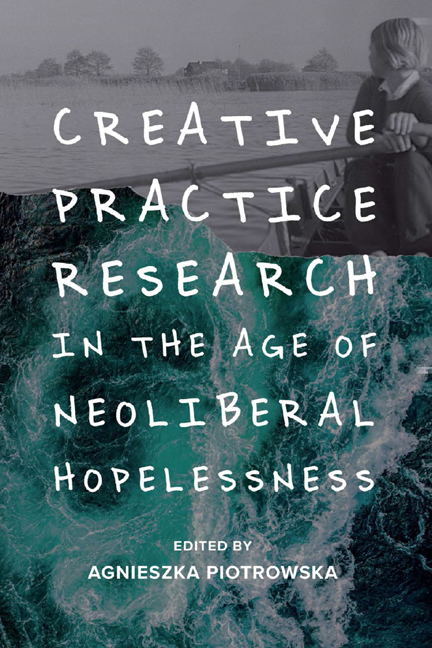Book contents
- Frontmatter
- Contents
- List of Figures
- Notes on Contributors
- Acknowledgements
- Preface: Life in the Post Pandemic Age
- Dedication
- 1 Introduction: Complexities, Compromises and Complicities
- 2 Against the Grain: Women Film Practitioners and Theorists Talk Creative Practice and Theory
- 3 Married to the Eiffel Tower: Notes on Love, Loss and Knowledge
- 4 Creativity and Neoliberalism: Between Autonomy, Resistance and Tactical Compliance
- 5 Tactical Compliance and the Persistence of Elsaesser
- 6 Storytelling and Game Playing
- 7 Autonomy and the Other Woman: Queer Active Agency and Postcolonial Expectations
- 8 From Neolithic to Neoliberal
- 9 First-person Expression on ‘Non-Western’ Screens: China as a Case Study
- 10 Scholarly Exploration of the Creative Process: Integrating Film Theory and Practice
- 11 Teaching Practice as Theory: Guerrilla Filmmaking
- 12 Baits of Falsehood: The Role of Fiction in Documentary or From Untheorised Practice to Unpractised Theory
- 13 Repented: A Creative Intersemiotic Translation
- Notes on Repented
- 14 How do you see me? The Camera as Transitional Object in Diasporic, Domestic Ethnography
- 15 ‘Shut Your Hole, Girlie. Mine's Making Money, Doll’: Creative Practice-Research and the Problem of Professionalism
- 16 Feminist ‘Pensive-creative Praxis’ and Irigaray: A Porous, Dialogical Encounter
- 17 The Paths of Creation, or How Can I Help my Dybbouk to Get Out of Me?
- 18 ‘We Want to Kill Boko Haram’: Reflections on the Photographic Representation of Children in a Displacement Camp
- 19 Between ‘Counter-movement’ (Ingold) and ‘Living with Ghosts’ (Demos)
- 20 Screen Memories: A Video Essay on Smultronstället/Wild Strawberries
- Index
10 - Scholarly Exploration of the Creative Process: Integrating Film Theory and Practice
Published online by Cambridge University Press: 17 October 2020
- Frontmatter
- Contents
- List of Figures
- Notes on Contributors
- Acknowledgements
- Preface: Life in the Post Pandemic Age
- Dedication
- 1 Introduction: Complexities, Compromises and Complicities
- 2 Against the Grain: Women Film Practitioners and Theorists Talk Creative Practice and Theory
- 3 Married to the Eiffel Tower: Notes on Love, Loss and Knowledge
- 4 Creativity and Neoliberalism: Between Autonomy, Resistance and Tactical Compliance
- 5 Tactical Compliance and the Persistence of Elsaesser
- 6 Storytelling and Game Playing
- 7 Autonomy and the Other Woman: Queer Active Agency and Postcolonial Expectations
- 8 From Neolithic to Neoliberal
- 9 First-person Expression on ‘Non-Western’ Screens: China as a Case Study
- 10 Scholarly Exploration of the Creative Process: Integrating Film Theory and Practice
- 11 Teaching Practice as Theory: Guerrilla Filmmaking
- 12 Baits of Falsehood: The Role of Fiction in Documentary or From Untheorised Practice to Unpractised Theory
- 13 Repented: A Creative Intersemiotic Translation
- Notes on Repented
- 14 How do you see me? The Camera as Transitional Object in Diasporic, Domestic Ethnography
- 15 ‘Shut Your Hole, Girlie. Mine's Making Money, Doll’: Creative Practice-Research and the Problem of Professionalism
- 16 Feminist ‘Pensive-creative Praxis’ and Irigaray: A Porous, Dialogical Encounter
- 17 The Paths of Creation, or How Can I Help my Dybbouk to Get Out of Me?
- 18 ‘We Want to Kill Boko Haram’: Reflections on the Photographic Representation of Children in a Displacement Camp
- 19 Between ‘Counter-movement’ (Ingold) and ‘Living with Ghosts’ (Demos)
- 20 Screen Memories: A Video Essay on Smultronstället/Wild Strawberries
- Index
Summary
The problematic relation between theory and practice has vexed Western thinking for the past two-and-a-half thousand years, and it is no surprise to discover this problem troubling film studies degree programmes and filmmaking courses. In the 1970s, Vlada Petrić (who co-founded the Harvard Film Archive in 1979 with Stanley Cavell and filmmaker Robert Gardner, and who curated the Archive until 1998) wrote a series of papers addressing pedagogical problems in the teaching of film:
The split between theory and practice in the study of cinema results in a ludicrous situation: students in cinema studies lack the practical experience without which they are unfit to fully comprehend the specificities of the medium, and students in film production are deprived of the theoretical/historical background which is crucial to their development … A university curriculum cannot be conceived with the intention of avoiding scholarly exploration of the creative process or the historical and theoretical analysis of an artistic achievement. (1976a: 3–4)
Petrić proclaimed the need to integrate theory and practice by developing a pedagogy that would combine film theory, film history, film analysis and film practice. The core of this integrated approach consists of the shot-by-shot analysis of film sequences in order to study what he called the filmmaker’s (usually the director’s) ‘cinematic strategy’ – their filmmaking knowledge plus practical shooting procedures and methods.
In this chapter I develop a theoretical understanding of film practice via Aristotle's concepts of epistêmê, technê and praktikos, although these concepts need to be reformulated and updated with recent advances in analytic philosophy, particularly Jason Stanley's rethinking of the opposition between ‘knowing-that’ and ‘knowing-how’ (2011). My aim in this chapter is therefore to develop a theory of a specific type of knowledge – of filmmaking as a problem-solving activity, which includes knowledge of the filmic options available to solve filmmaking problems. This theoretical understanding of film practice will be used to examine the way technique is conceptualised in filmmaking manuals (especially Karel Reisz's The Technique of Film Editing [1968]) and in Petrić's studies of cinematic strategy in his shot-by-shot analysis of film sequences (Petrić 1976b; 1982; 1987). I argue that the core competence behind cinematic strategy consists of first-person modal knowledge that guides ‘decision-making’ and ‘problem-solving’.
- Type
- Chapter
- Information
- Creative Practice Research in the Age of Neoliberal Hopelessness , pp. 133 - 149Publisher: Edinburgh University PressPrint publication year: 2020

